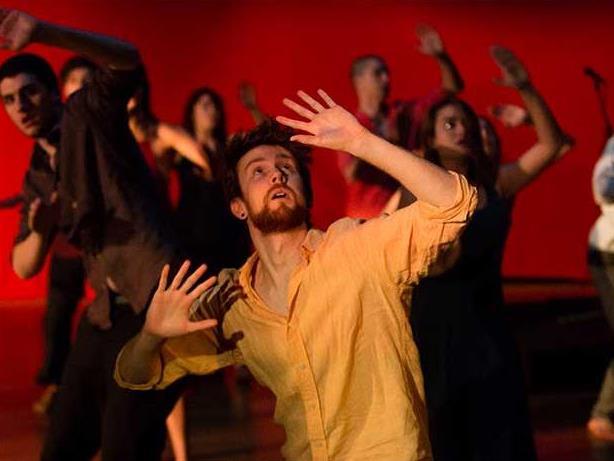Image: supplied.
When the Turnbull government cut the number of creative courses eligible for the VET FEE-HELP scheme as part of tertiary education reforms last year, many were fearful that students wouldn’t be able to afford to finish their courses or even start one in the first place.
The change meant that the number of creative courses eligible for government subsidies dropped from 70 to 13, impacting not only students but also important educational institutions who offered courses in everything from circus training to ceramics to acting.
Six months after the announcement, ArtsHub spoke to the 30 year old training institute Actors Centre Australia (ACA) to find out how the loss of funding has affected students studying the Advanced Diploma of Performing Arts (Acting), as well as the institution itself, which following the announcement decided to halt last year’s intake.
Somewhat surprisingly, the news isn’t all bad and staff have been working behind the scenes to ensure future financial support is available for students if required.
‘Some of our students don’t need it, but over the years more and more students have been taking up VET FEE-HELP,’ said Allan Rendell, General Manager of ACA.
‘We are trying to find methods of getting better interest rates. Another program we are working on is how they can work that debt off. If they do take a loan, we want to then get them a job at the end so the loan isn’t such a burden on them.’
The fallout of funding cuts in arts training
At the time of the announcement in October last year, Minister for Education and Training Simon Birmingham said reform was needed to refocus on courses that benefited Australia economically.
‘Currently there are far too many courses that are being subsidised that are used simply to boost enrolments, or provide “lifestyle” choices, but don’t lead to work,’ said Birmingham.
The devaluing of creative work implied by the reform overlooked the social and economic value of the arts.
‘The government is very good at creating bold statements, like “good debt, bad debt” and this is the perfect example. Actually, it is good debt if it means we keep our grandparents living longer and our children being educated,’ said Rendell.
At the same time, the reform makes an oversimplified claim about vocational education in Australia. Rendell said the cuts to financial assistance for creative courses missed an opportunity to really examine the benefits and limitations of vocational training in Australia. While the reforms in part address the debt cycle where some students remain unemployed or on low wages after completing training, it is also to stop what the government has called “dishonest providers”. But the sweeping changes mean honest providers are punished as well.
‘They have bundled all of vocational training into one, including TAFE, as bad. What aspects of vocational training are bad? We know the people rorting the system are bad, but a lot of the courses that were cut are actually delivered in higher education. There is a very confusing message going around about what is bad with vocational training,’ said Rendell.
ACA is one of those education providers who, despite providing some of the highest quality training in performing arts in Australia, has been lumped in with the majority.
‘We are rated as one of the five best acting schools in Australia next to the government training institutes like WAAPA, NIDA, VCA, and Queensland University, which all train the best actors in Australia – we are rated alongside them,’ explained Rendell.
From a management point of view, Rendell said dealing with the fallout has been stressful. While the government committed to the continuation of financial support for those students currently enrolled the first payment was three months late.
‘As an institute we had to carry that burden for the first three months. It doesn’t sound much, but when you are talking about half a million in wages it’s a lot of money.’
‘We tried to stem the worry of our students. Initially, when it was announced, we had a lot of parents calling up and there was a lot of chatter. And we put our neck on the line and said we would find a way through this.’
Here’s the good news
Despite all the heartache and stress this reform has caused the arts, ACA is working towards a new model to provide what could potentially be better financial support for future students than the previous VET FEE-HELP scheme.
‘These changes mean we are looking at creative ways to go out and find funding sources that will have less of an impact or burden on our students,’ said Rendell.
‘We are looking at the positives and what we can work around. In all honesty, it would have been easier to just close our doors and walk away but we believe in what we are doing.’
Rendell said ACA is continuing to develop a ‘cradle-to-grave model’ that puts the industry at the forefront. This will provide a way forward for both students and ACA as it will lead to employment opportunities in the industry for graduates.
‘I think if we want to develop actors and the government is then saying “well that’s creating a debt-cycle” we don’t want to be part of a student debt-cycle. We are not only looking for ways students can borrow money or how we can loan them money to do the course, we are looking for ways they can self-fund that and walk away and not cause a debt cycle and not have that hanging over them.’
‘If the government had given us an extra year we probably would have been in a better situation to go “That’s fine, no need. We already have a better solution on board.” However, necessity has now sped that up.’
The model includes a new blanket scholarship that lowers the cost of course fees for everyone who enrolls. Directors of ACA Dean Carey and David Chiem are also offering an interest-free loan of $14,000 to lower the amount of debt for students who need a loan to study. Rendell also said a new innovative merger with childcare provider MindChamp will also provide opportunities in future.
‘I’m in lock down on some of it, but it is all around giving our graduates, and other people at their level, work,’ he said.
‘We are just mapping something out at the moment and hopefully we can release more information soon.’
To find out more about the Advanced Diploma of Acting at ACA, visit http://www.actorscentre.com.au/full-time-course_2017




